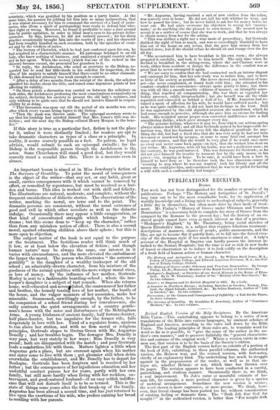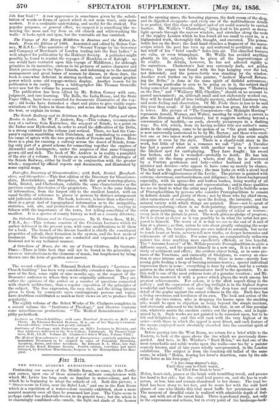PUBLICATIONS RECEIVED.
Booms.
THE week has not been distinguished for the number or promise of its publications. Perhaps " The History and Antiquities of St. David's " may turn out to be the most remarkable book, for its application of worldly knowledge and a living spirit to archaeological subjects, generally a little dry in themselves, but often made drier by their mode of treat- ment. Mr. Finlay's " History of Greece under Othoman and Venetian Domination" is a necessary book to complete his story of Greece from the conquest by the Romans to the present day ; but the history of an en- slaved people cannot have even as much interest as that of a province. " Shakspere's England," by Mr. Thornbury, being social sketches of Queen Elizabeth's time, is a subject that requires felicitous treatment: descriptions of manners, classes of people, public amusements, and the like, are apt to become flat if quietly done, or to fall into the forced viva- city of the showman style if too much smartness is aimed at. A lady's account of the Hospital at Smyrna can hardly possess the interest at- tached to the Scutari Hospitals ; but the time is not so rich in new books of travel or observation as to induce it to look coldly on the description of a fresh field of human action or human character.
The History and Antiquities of St. Darid's. By William Basil Jones, M.A., Fellow of University College, and Edward Augustus Freeman, M.A., late Fel- low of Trinity College, Oxford.
The History of Greece under Othoman and Venetian Domination. By George Finlay, LL.D., Honorary Member of the Royal Society of Literature, &c. Shakspere's England ; or Sketches of our Social History in the Reign of Eliza- beth. By G. W. Thornbury, Author of the " History of the Buccaneers," &c. In two volumes.
Isineer ; or Smyrna and its British Hospital in 1855. By a Lady.
A Summer in Northern Europe ; including Sketches in Sweden, Norway, Fin- land, the Aland Islands, Gothland, &c. By Selina Bunbury, Author of " Life in Sweden," &c. In two volumes.
Perversion ; or the Causes and Consequences of Infidelity : a Tale for the Times. In three volumes.
The Sorrows of Gentility. By Geraldine E. Jewsbury, Author of "Constance Herbert," &c. In two volumes.
Revised English Version of the Holy Scriptures. By the American Bible Union.—This undertaking appears to belong to a series of new translations of the Bible into various languages, by eminent scholars of England and America, according to the rules laid down by the Bible Union. The leading principles of those rules are, to translate word for word so far as is possible, to "give the sense of the author in the au- thor's own manner," and to preserve faithfully the "general characteris- tics and costume of the original work." Where a version exists in com- mon use, that version is to be the basis of the Society's edition.
The first part of the English version before us consists of a portion of the book of Job ; exhibiting, in three parallel columns, the authorized version, the Hebrew text, and the revised version, with foot-notes, chiefly of an explanatory kind. The undertaking has much to struggle against in the prepossession of the reader, as well as in that an- tique air, whether Hebraic or not, which time has thrown over its pages. The revision appears to have been conducted in a careful, painstaking, and studious manner. Occasionally there is, we think, a real improvement. To Job's curse or mournful estimate of hu- man life, for example, a more poetical character is given by a species of metrical arrangement. Sometimes the new version ia neater; the word chosen is more expressive, or more precise. We think, how- ever, that literal change has been pushed too far, without consideration of existing feeling or dramatic form. The " Doth Job fear God for nought ? " in the authorized version, is better than " For nought doth
Job fear God ? " A raw appearance is sometimes given by the substi- tution of words or forms of speech which do not seem truer, only more modern. It is a creditable undertaking, and useful for the student. For popular purposes, or general effect, we suspect it is something like re- moving the moss and ivy from an old church and whitewashing the walls : it looks spick and span, but the venerable air has vanished.
The Voyage of Sir Henry Middleton to Bantam and the Maluco Is- lands. From the Edition of 1606. Annotated and edited by Bolton Cor- net', M.R.S.L.—This narrative of the "Second Voyage by the Governor and Company of Merchants of London trading into the East Indies" is well adapted for publication by the Hakluyt Society. A publisher might possibly be found to reprint the voyages of Hawkins or of Raleigh : no one would have ventured upon this voyage of Middleton ; for although primitive in its narrative, curious in its pictures of native character and Dutch proceedings in the Spice Islands, and informing as to the nautical management and great losses of seamen by disease, in those days, the book is somewhat deficient in stirring incident, and that quaint graphic power which some old voyage-writers display. Another reason for its publication is its rarity. Even a bibliographer like Thomas Grenville never saw but the volume he possessed. The publication has been edited by Mr. Bolton Corney with care, judgment, and rare learning. The Rolls, the India House, and the State Paper Office, have been consulted for documents illustrative of the voy- age ; old books have furnished a chart and plates to give visible repre- sentations of the Indies in those days ; and notes throw fuller light upon the text, or explain its terms.
The &lade Railway and its Relations to the Euphrates Valley and other Routes to India. By W. P. Andrew, Esq.—This volume, recommenda- tory of a railway from Kurrachee, the sea-port of Scinde, to a point on the Indus near Hyderabad, in order to avoid the difficulties of the Delta, is a strong contrast to the volume just noticed. There, we had the Com- pany's captain squabbling with Dutchmen, and negotiating to complete his cargo of spices with the two petty chiefs of Termite and Tidore. Here there is a plan for running a railway across the desert of Scinde, form- ing only part of a grand scheme for connecting together the empires of Alexander and Anrungzebe, under the auspices of that same Company grown old and rich. The book of Mr. Andrew is in reality a pamphlet of the size of a volume. It contains an exposition of the advantages of the Scindo Railway, either by itself or in conjunction with the greater whole ; supported by official reports and documents, and illustrated by some capital maps.
Post-office Directory of Gloucestershire; with Bath, Bristol, Hereford- shire, and Shropshire.—This first edition of the Directory for Gloucester- shire, Herefordshire, and Shropshire, with the great watering-places, Bath, Bristol, and Cheltenham, exhibits the same characteristics as the previous county directories of the proprietors. There is the same fulness of information, from the largest city to the smallest hamlet, with an equal facility Of reference to places or persons by distinct arrangement and judicious subdivision. The book, however, is more than a directory : there is a great deal of topographical information as to the antiquities, statistics, soil, site, and productions of the different places, varying in fulness with the importance of the town, but telling something of the smallest. It is a species of county history as well as a county directory.
On Calculous Disease and its Consequences. By G. Owen Rees M.D., ' F.R.S. &c.—This volume consists of the Croonian Lectures Which its author delivered in the present year, with some modifications to fit them for a book. The branch of the disease handled is chiefly the constituent properties of calculi, their formation in the system, and the best mode of treatment. The investigations are conducted and expounded in a pro- fessional not to say technical manner.
A astechism of Music, for the use of Young Children. By Gertrude Place.—There is little here that will not be found in the generality of tutors or introductions to the elements of music, but lengthened by being thrown into the form of question and answer.
The second edition of Mr. Edmund Beckett Denison's "Lectures on Church-building" has been very considerably extended since the appear- ance of the first, some eight or nine months ago, at the request of the Doncaster audience to whom they were originally addressed. They are rather the opinions of the author on a number of questions connected with church architecture, than a regular exposition of the principles of the subject. The free expression, the racy style, and the living interest given to them by comments upon contemporary persons and topics, have doubtless contributed as much as their views on art to produce their popularity.
The eighth volume of the Select Works of Dr. Chalmers completes in a second volume the "Institutes of Theology," and likewise contains some miscellaneous productions. " The Medical Remembrances " is a pithy pocketbook.
Lectures on Church-building; with some Practical Remarks on Bells and Clarks. By Edmund Beckett Denison, M.A., one of her Majesty's Counsel. Second edition : rewritten and greatly enlarged.
Institutes of 7'heologg ; with Prelections on Hill's Lectures in Divinity, and four Addresses delivered in the New College, Edinburgh. By Thomas Chal- mers, D.D., LL.D. Volume II. (Chalmers's Select Works, Volume VIII.) The Medical Reniembraneer ; or Book of _Emergencies: concisely pointing the immediate Treatment to be adopted in cases of Poisoning, Drowning, Apoplexy, Burns, and other Accidents. By Edward B. L. Shaw, late Sur- geon to the Royal Humane Society. Fourth edition, rewritten and much enlarged, by Jonathan Hutchinson, Surgeon to the Metropolitan Free Hos-



































 Previous page
Previous page